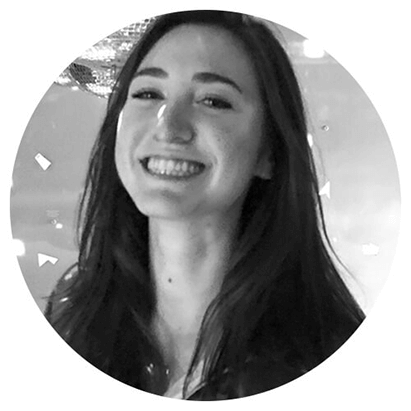My Manifesting Experiment: How I Got What I Didn’t Know I Needed

Photo courtesy of alexnoiret.com

Kelly Martin is an assistant editor at goop. She’s the most skeptical yet most open-minded person on our team, and that’s why we love her.
Afternoon light is streaming through a westward-facing window—a floor-to-ceiling window in fact. The walls are exposed brick; the bookshelves are packed with Michael Pollan, Stephen King, and stacks of authors that make me feel smarter. And outside my West Village apartment, just across the street, there’s a café serving the best pain aux raisins this side of the Seine. This afternoon, I’ll grab one—plus a mocha—on my way to class, where we’re studying urban food policy. And later, I’ll have my hands in dirt, teaching kids about carrots in a local school gardening program. By 8, I’ll meet up with my boyfriend (who’s perpetually awash in a golden light) back at the café. We’ll have something French and delicious. And then I’ll go to bed with a book and Taz, my Dutch shepherd.
None of this is my real, of course, save the dog and the bedtime reading. But I’m manifesting it. I am imagining my dream life as if I’m living it now. As if I can smell the pain aux raisins in front of me.
This is the last leg of a three-part sequence called the Ziva technique. The three parts—mindfulness, mantra-based meditation, and manifesting—are more than spiritual alliteration. The technique was developed by Emily Fletcher, who promised me this trifecta would be the answer to all of my dreams.
If you mixed zest and charm you’d get Fletcher. Considering her large, devoted following, one might be inclined to think Ziva is a personality cult. Fletcher, though, attributes its success to the effectiveness of the technique. She would know. After a decade working as an understudy on Broadway, Fletcher was run-down, anxious, and unable to sleep. Learning meditation turned around her mental health and, according to her, solved her insomnia in a day. Just one. So she left Broadway, moved to India for three years of teacher training, and founded Ziva Meditation—her studio in SoHo. The goal—and it’s a lofty one—is to use mindfulness, meditation, and manifesting to rid the world of unnecessary suffering.
It may seem Sisyphean—but to Fletcher and her students, it’s totally reasonable. So far, Fletcher’s guided several thousand budding meditators, including a client list of Oscar winners, professional athletes, Fortune 500 CEOs, and people who you’d otherwise assume are too busy to meditate. And Fletcher’s new book, Stress Less, Accomplish More, makes her technique easily accessible for the first time. The book is a discounted point of entry; you can become a self-sufficient meditator for the price of a hardcover. This is a good deal, considering what the courses cost. Ziva charges $399 for its online course, and the in-person price is kept secret until you’ve sat through a two-hour intro talk. If you need a hint: It’s more than $399.)
I took Ziva’s fifteen-day online course, which promised, repeatedly, to make me “good at life.” The first day, I learned to breathe (in a deeper, more meaningful way than I’d been doing for twenty-three years). The next, I learned to feel my feelings. I live in Los Angeles, where I’ve been drinking mindfulness through the (much-maligned) tap for the last five years, so this part was as easy as it was blissful.
Then, over the course of a few more days, I chose a mantra (sorry—it’s private) and bounced it around in my head, marinating in Fletcher’s recitations of all the ways stress was ruining my life and how meditation can fix it—if I practice twice a day, every day, for the rest of my life. (No, she assures me through my screen, this is not a cult.) And it works. I feel good. Really good. Don’t-need-that-second-cup-of-coffee good.
And finally, Fletcher brought the Ziva trifecta to a close with manifesting—what Ziva thinks of as its dessert course and what I came to think of as serious magical thinking. If mindfulness and meditation build calm and focus, manifesting asks: What are you going to do with it?
We see our future as a shiny object. We turn it over again and again. We hold it up to the light to see what it reflects. And the imagination we apply—okay, I apply—to the future is highly imprecise. Happiness! Success! Cash! More cash! And while these might work as general targets, Fletcher says, they’re vague, and how are we supposed to get there if “there” isn’t an explicit destination?
Fletcher wants to change that. Take your shiny object, she advises, and look for the light it casts around it. The nicks in its surface. The measured angles at which it’s cut. In other words, your dream life, if it is to be universe-sanctioned, requires scrutiny. What you want and why you want it, defined with precision, inspected daily.
Meticulously plotting a dream life, for me, is like trying to define the cosmos in a single adjective. It’s not that I don’t know what I want to do; it’s that I want to do everything. Like, after I’ve solved world hunger and my debut novel wins a Pulitzer, maybe I’ll cure diabetes, hike the Pacific Crest Trail, and open a bookstore-slash-café that lands itself in goop’s essential guide to Paris. But for the sake of practice—and fingers crossed, it could punt me in the right direction—I homed in on an immediate goal: graduate school.
This focus was not arbitrary; I had applied to Columbia University’s master of public health program only weeks before. For months, I had made GRE prep books my nearest, dearest friends—geometry problems were my morning routine, vocab flashcards my gym buddy, and practice tests my big nights out—and fallen asleep at night with a personal statement in one hand and a red pen in the other. This was a future, if there were any truth to Ziva’s most enigmatic step, that I could bring into being.
Months later—and deep, deep into my mindfulness/meditation/manifestation practice—my selected dream life came knocking, via email. One breathless call to Mom later, I was New York–bound.
Or so I thought.
What I expected from that afternoon’s meditation was bliss. A manifestation that I could reach out and touch, now unburdened from make-believe. The dream apartment in full color, Columbia’s campus dressed in crisp autumn colors, and visions of my best friends—budding New Yorkers themselves, in real life—towed along for wide, gooey slices of pizza out a shop window at 11 on a Tuesday night.
But in all this internal dialogue, reality rang its gong. When I sat down to meditate and manifest, none of this dream came to me. Instead: a great big nothing. After four weeks of consistent daydreams of my triumphant return to school, I couldn’t conjure it up. I ran through Fletcher’s incantations: “Consciously create a life you love.” “Imagine your dreams as if they are happening now.” And on and on. I don’t know what it is in your head that’s in charge of manifesting, but every time I tried to nudge its great big nothing in the direction of any teeny anything, it simply refused. No, it maintained. I’ll stay right here, thanks.
I started to question whether I was going about this wrong. What does it take to make the shoe fit? A magic spell? Should I chop off my toes? I couldn’t find the answer in Ziva’s online modules, so I called Fletcher herself.
I was not doing this wrong, Fletcher reassured me. Manifestation, she clarified, is never about the goal itself, but the feeling that you imagine achieving it will bring. And when you manifest, you can revel in the experience of that success even if it’s not really happening. In other words: It’s future happiness you can enjoy now. It allows you to let go of the idea that happiness lies on the other side of goals that—as she expects, and as I experienced—are likely to change.
Change of mind validated, I did what would have been unthinkable a few months earlier: I turned down my dream grad program. And the future, having been shaved to a point over the past few months, ballooned back up into the thousand things I hope it could be.
My manifestations, now, are less elaborate. Fletcher advised me not to try so hard (letting go: my toughest nut) and instead to go with whatever would bring a smile to my face in that moment. The books are still there. The dog is still there. But the rest changes daily, and sometimes I don’t picture anything at all. But I feel, as Fletcher swore I would, better at life. Whether it’s the one I’m living—or the one I’m dreaming about.